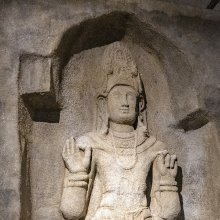Araksha, Ārakṣa: 11 definitions
Introduction:
Araksha means something in Hinduism, Sanskrit. If you want to know the exact meaning, history, etymology or English translation of this term then check out the descriptions on this page. Add your comment or reference to a book if you want to contribute to this summary article.
Araksha has 10 English definitions available.
The Sanskrit term Ārakṣa can be transliterated into English as Araksa or Araksha, using the IAST transliteration scheme (?).
Images (photo gallery)
Languages of India and abroad
Sanskrit dictionary
[Deutsch Wörterbuch]
Source: Cologne Digital Sanskrit Dictionaries: Böhtlingk and Roth Grosses Petersburger WörterbuchĀrakṣa (आरक्ष):—(von rakṣ mit ā)
1) adj. bewacht, beschützt, = rakṣāyukta [Śabdaratnāvalī] zu bewachen, = rakṣaṇīya [VIŚVA im Śabdakalpadruma] —
2) m. Schutz, Wache, = rakṣaka [Hemacandra’s Anekārthasaṃgraha 3, 729.] teṣāmārakṣabhūtaṃ tu pūrvaṃ daivaṃ niyojayet . rakṣāṃsi hi vilumpanti śrāddhamārakṣavarjitam [Manu’s Gesetzbuch 2, 204.] ceratuścārakṣagatau tau senāṃ sarvato diśam [Rāmāyaṇa 5, 75, 2.] rākṣasān śataśastasminnārakṣe madhyame sthitān [10, 22.] śūnyasaṃvaraṇārakṣām (rājadhānīm) [2, 88, 19.] Auch f. ārakṣā [Śihlana’s Śāntiśataka 3, 5]; gṛhe paryantasthe draviṇakaṇamoṣaṃ śrutavatā svaveśmānyārakṣā (l. svaveśmanyā) kriyate . —
3) m. die Gegend, wo die beiden Erhöhungen auf der Stirn des Elephanten zusammenstossen (kumbhasaṃdhi), [Trikāṇḍaśeṣa 2, 8, 37.] die Gegend unterhalb dieser beiden Erhöhungen (hastikumbhādhaḥ) [Hemacandra’s Abhidhānacintāmaṇi 1226.] [Anekārthasaṃgraha 3, 729.]
--- OR ---
Ārakṣa (आरक्ष):—
2) ārakṣasya (so die ed. Bomb.) vidhiṃ kṛtvā yodhānāṃ tatra [Mahābhārata 5, 5409.]
Source: Cologne Digital Sanskrit Dictionaries: Sanskrit-Wörterbuch in kürzerer FassungĀrakṣa (आरक्ष):——
1) m. und kṣā f. ([Indische sprüche 2196]) Schutz , Wache. Am Ende eines adj. Comp. f. ā. —
2) m. *eine best. Stelle auf der Stirn eines Elephanten.
Sanskrit, also spelled संस्कृतम् (saṃskṛtam), is an ancient language of India commonly seen as the grandmother of the Indo-European language family (even English!). Closely allied with Prakrit and Pali, Sanskrit is more exhaustive in both grammar and terms and has the most extensive collection of literature in the world, greatly surpassing its sister-languages Greek and Latin.
See also (Relevant definitions)
Starts with: Araksha-dala, Arakshadhikrita, Arakshak, Arakshaka, Arakshan, Arakshana, Arakshanata, Arakshant, Arakshas, Arakshasa, Arakshasya, Arakshat.
Ends with (+76): Angaraksha, Annapanaraksha, Annaraksha, Aparaksha, Ashvaraksha, Atmaraksha, Balaraksha, Baraksha, Bhagavadgitarthasamgraharaksha, Bhagavadgitharthasamgraharaksha, Brahmanaraksha, Cakaraksha, Cakraraksha, Caraksha, Chakaraksha, Charaksha, Deharaksha, Desharaksha, Dhanaraksha, Dharmaraksha.
Full-text: Arakshadhikrita, Arakkha, Agniketu, Nishacara, Rakshasi Avatara, Tal-araksha, Duraraksha, Mallari, Arakshika, Sanniyamit-prakritik-aaraksh, Arakshaka, Hedamba, Pratisara, Pa, Rakshasi, Talara, Arakshya.
Relevant text
Search found 7 books and stories containing Araksha, Ā-rakṣa, A-raksa, Ā-rakṣā, A-raksha, Ārakṣa, Araksa, Ārakṣā; (plurals include: Arakshas, rakṣas, raksas, rakṣās, rakshas, Ārakṣas, Araksas, Ārakṣās). You can also click to the full overview containing English textual excerpts. Below are direct links for the most relevant articles:
Manusmriti with the Commentary of Medhatithi (by Ganganatha Jha)
Verse 3.204 < [Section XIII - Order of Sequence]
Maha Prajnaparamita Sastra (by Gelongma Karma Migme Chödrön)
Appendix 1 - The community of the five (pañcasādhāraṇa) < [Chapter XIX - The Characteristics of Generosity]
Village Folk-tales of Ceylon (Sri Lanka), vol. 1-3 (by Henry Parker)
Story 16 - How A Yaka And A Man Fought < [Part I - Stories told by the Cultivating Caste and Vaeddas]
Trishashti Shalaka Purusha Caritra (by Helen M. Johnson)
Appendix 2.3: new and rare words < [Appendices]
Sanskrit sources of Kerala history (by Suma Parappattoli)
5. The Kama-sandesa by Matridatta < [Chapter 4 - Traces of Historical Facts from Sandesha Kavyas and Short poems]
Jarasandhavadha Mahakavyam (by Pankaj L. Jani)
Part 4 - Story of the Jarasandhavadha Mahakavyam < [Critical Introduction]
Part 5 - Canto-wise Summary (of the Jarasandhavadha Mahakavyam) < [Critical Introduction]




